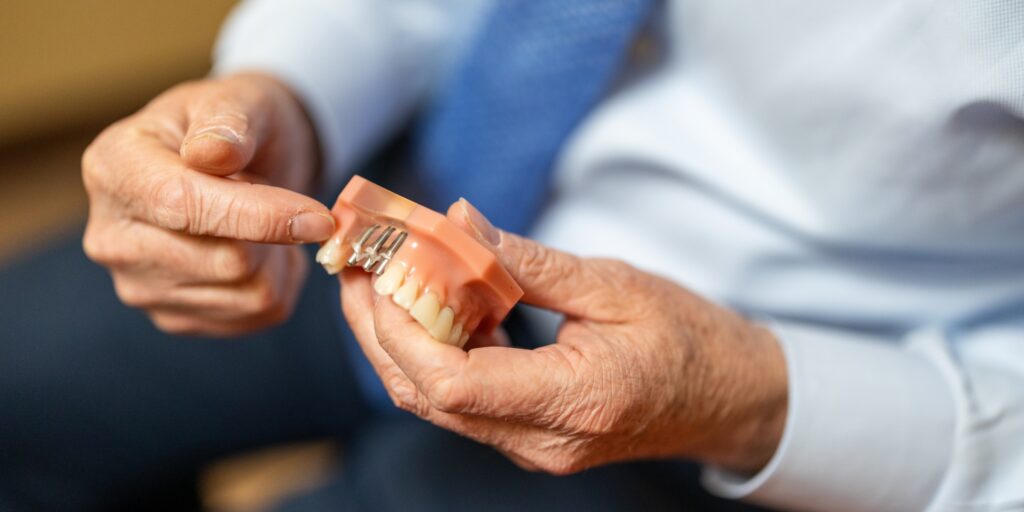
For a Complete Smile, Turn to the Long-Term Tooth Replacement Solution
If you are missing a tooth or need to have a tooth removed, your oral surgeon may suggest dental implants for tooth replacement. They replace both the root and the crown of your tooth, providing you a long-lasting solution that looks and feels like your natural tooth.
Dental implants are the foundation on which a custom-made crown is built. Our surgeons offer many types of dental implant treatments to patients in need of replacing teeth in Franklin and Thompson’s Station TN, and surrounding areas.
Dental implants are the only tooth replacement solution that prevents bone loss. See how they work and how they can improve your smile.
The Benefits of Dental Implants
A Long-Term Solution.
Most traditional methods, such as tooth-supported dental bridges, offer patients a solution for missing teeth for as little as 5–10 years. With proper care, a dental implant can last a lifetime.
Natural-Looking Results.
Implants feel just like natural, healthy teeth, and many patients forget they even have them. With healed implants, you will not need to worry about temporary or removable dentures or tooth-supported replacements that may fall out or loosen during everyday activities.
Easier Speaking and Eating.
They enable you to bite into and properly chew your favorite foods without worry. Dental implants don’t require any special care; you just need to brush, floss, and have routine professional dental care, just like natural teeth.
Retain Natural Facial Aesthetics.
Because implants help to maintain the natural bone that holds teeth in place, patients can avoid the common shrunken or sagging appearance that happens when teeth are missing.
Protect Oral Health.
They keep neighboring teeth from shifting or moving in the mouth that commonly occurs when a tooth is lost and not replaced. This shifting worsens the longer a tooth has been missing. Dental implants prevent adjacent teeth from shifting into the open space and because the post fuses to the jaw bone, they protect the bone from deteriorating due to tooth loss.
Dental implants preserve tooth alignment, prevent bone loss, restore your ability to eat, and eliminate the need for dentures.
Types of Dental Implants
- Immediate (Same-Day) Implants. By combining tooth extraction and implant placement, our surgeons can save you time and money. More importantly, it allows you to have your replacement tooth sooner.
- Single Implants. One dental implant can replace one failing or missing tooth anywhere in the mouth, including front teeth and molars.
- Implant-Supported Bridge. Traditional bridges require your healthy teeth to be reshaped to fit the bridge. Instead, a dental implant can support the bridge and protect the need to damage your other teeth.
- All-on-4® Treatment Concept. This full-arch restoration procedure uses four dental implant posts to secure a new row of teeth in one or both dental arches.
Dental Implant Surgery
The overall length of treatment can vary based on each patient’s individual needs. Some patients require a bone graft procedure to create or restore the correct height and width of their jaw bone in the area where the dental implant will be placed. We will outline the details of your specific treatment during the consultation. We will also take 3D scans and discuss your options for anesthesia during this visit.
Your surgeon will administer the selected form of anesthesia, make a small incision in the gum tissue, and place the implant post. This post will fuse to the jaw bone over the course of a few months. When you have fully healed, your restorative dentist will place the final, custom-made crown.
In many cases, we can even connect a provisional (temporary) tooth to your post at the time it is placed. This can be particularly beneficial when replacing front teeth with dental implants. An immediate provisional tooth helps to preserve the natural shape and appearance of your gums, which often leads to a more aesthetic final result. Your doctor will discuss whether connecting an immediate provisional tooth to your dental implant is the right treatment choice for you.
We use the highest quality of materials for our dental implants so our patients can enjoy beautiful, lasting results.
Dental Implant Value
Every patient is unique and the cost for treatment varies. We factor in your choice of anesthesia, the number of implants you need, if you require bone grafting or extractions, and your insurance. At the consultation, we will provide a cost estimate for your treatment.
Dental implants are more than just a way to replace a tooth—they have the power to make you feel confident about your smile. With dental implants, you can enjoy eating, smiling, and laughing again. Patients with removable dentures often feel embarrassed about having to remove them during meals and cleaning. Plus, dentures must be replaced every few years and cleaned in special rinses.
With dental implants, there is no special care. Brush and floss regularly, and your replacement tooth will serve you for many years. They have a high success rate, are the only replacement solution to prevent bone loss, and are incredibly versatile to match your unique needs.
Types of Anesthesia
There are several anesthesia options available so patients can feel comfortable and at ease during treatment.
A local anesthetic is administered in the specific surgical area and can be used in conjunction with other anesthetic options, such as nitrous oxide. The patient remains awake and only the surgical area is numbed, so the patient can still drive home after.
Nitrous oxide, also known as laughing gas, is administered through a mask when patients experience anxiety before the procedure. It provides mild pain-relieving effects and induces a relaxed state. Your surgeon can pair laughing gas with local anesthesia.
IV sedation renders a sleep-like state in which patients do not feel pain. This is commonly used in dental implant placement and the removal of wisdom teeth. General anesthesia, which renders the patient unconscious, is reserved for complex procedures, such as facial trauma or jaw surgery.

